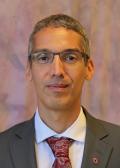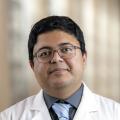2022 Recipients
Dr. David Osher & Dr. Stacy Harnish
Neural Plasticity Following Speech Therapy in Chronic Aphasia
Project Description
What are the neural and genetic mechanisms that underlie recovery from stroke? We will investigate neural changes that occur following intensive speech therapy, and how this neuroplasticity is mediated by 2 candidate genes important for language, cognition, and neuroplasticity. This project will leverage an existing recruitment pipeline, offering unprecedented access to individuals with chronic aphasia. We will genotype patients and perform behavioral testing and neuroimaging (structural MRI, connectivity, and fMRI scans of language and cognition) before and after speech therapy to ask which neural or genotypic markers are predictive of therapeutic gains, and identify neural mechanisms of plasticity with recovery. This type of longitudinal dataset (including MRI, genetic, and behavior in patients undergoing therapy) is rare and will make a large impact on our field by discovering mechanisms of plasticity and recovery.
Research Team

P.I. David Osher, PhD. Assistant Professor in Psychology, OSU
Dr. Osher explores the relationship between brain connectivity, neural function, and behavior, through computational modeling. He utilizes machine learning approaches to integrate brain circuitry with cognitive processes, enabling technologies that can predict how an individual’s brain will respond to a task, or predict whether an individual will develop dyslexia. His experience with fMRI, neural circuitry, and machine learning will be critical for this study. Learn More >

P.I. Stacy Harnish, PhD, CCC-SLP. Associate Professor in Speech and Hearing Science, OSU
Dr. Harnish is an ASHA certified speech-language pathologist with research interests in aphasia treatment and the neural underpinnings of aphasia rehabilitation. She directs the Aphasia Lab at OSU, and has built an impressive recruitment pipeline through a network of hospitals throughout central Ohio. Dr. Harnish’s expertise with aphasic patients and as a clinician are essential for this study, and she will direct the recruitment, behavioral assessments, and therapy of all patients. Learn More >
Co-P.I. Chris Bartlett, PhD. Principal Investigator, Nationwide Children’s Hospital
Co-P.I. Victoria Diedrichs, MA, CCC-SLP, CBIS. Graduate Student, Speech and Hearing Science, OSU. Learn More >
Dr. Fábio Leite, Dr. Margaret Young & Dr. Subhankar Chakraborty
Discovering Optimal Music-Assisted Interventions (DOMAIN)
Project Description
Music has demonstrably improved experiences for patients undergoing invasive procedures by lowering overall pain levels, decreasing opioid use in post-operative care, and increasing the likelihood of patients repeating procedures in the future. Our project’s goal is to understand the therapeutic benefits of a non invasive, self-regulated music intervention for patients undergoing gastrointestinal procedures (e.g., endoscopy, manometry), leading to customized interventions with a high likelihood of maximizing the pre-, during, and post-procedure benefits to the patients. The study will focus on distinguishing the effects of music itself from other stimuli by verifying attentional engagement across conditions.
Research Team

P.I. Fábio Leite, PhD. Associate Professor of Psychology, Lima, OSU
Dr. Leite's research training is in the modeling of cognitive processes, and his primary line of research involves the analysis of response time and accuracy data from quick decisions in order to infer how people process information and make speeded decisions. He has also studied how well IQ predicts response time (compared with a perceptual threshold measure, inspection time) and how cooperative decision making evolves in an experimental session in light of different performance strategies adopted by the other player. In addition, he has collaborated in I/O Psychology projects using analyses of discourse to assist in understanding the behavioral dynamics of groups. Learn More >

P.I. Margaret Young, DMA. Associate Professor of Music, Lima, OSU
Young’s passion lies in developing accessible and relevant curricula for undergraduate students—specifically the development of functional piano skills for music majors. This research interest has led to additional investigations into the role of technology in piano classes, the applicability of piano proficiency examinations, and pathways to successful outcomes for undergraduate music students. Her expertise in music teaching and explorations into the relationship between music and wellness will be useful to the team as they are attempting to understand music’s role in influencing physiological responses. Learn More >

P.I. Subhankar Chakraborty, MD, PhD. Assistant Professor, Wexner Medical Center, OSU
The overall mission of Dr. Chakraborty's research is to help improve the quality of life of patients who suffer from functional gastrointestinal disorders. This could be either primary (no other underlying cause) or secondary (for instance due to the effect of chemotherapy or radiation). During his PhD, his research focused on the pathophysiology, diagnosis and novel treatment of pancreatic cancer. During his gastroenterology training, Dr. Chakraborty chose to focus on the field of gastrointestinal motility and esophageal diseases. Functional gastrointestinal diseases are common, both in cancer and non-cancer patients. Dr. Chakraborty is interested in holistic treatment of these patients in collaboration with specialists from other disciplines to design novel therapeutic strategies for patients with functional bowel disorders. Learn More >
Co-P.I. Eugenia Costa-Giomi, PhD. Professor of Music Education, OSU. Learn More >
Co-P.I. Daniel Shanahan, PhD. Associate Professor of Music Theory and Cognition, OSU. Learn More >
